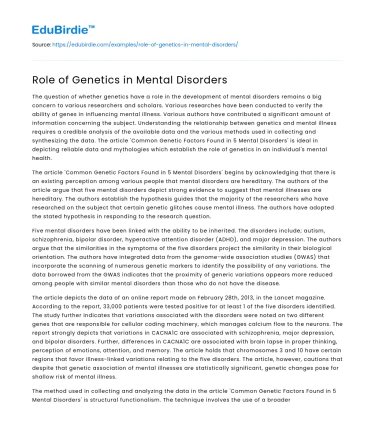The question of whether genetics have a role in the development of mental disorders remains a big concern to various researchers and scholars. Various researches have been conducted to verify the ability of genes in influencing mental illness. Various authors have contributed a significant amount of information concerning the subject. Understanding the relationship between genetics and mental illness requires a credible analysis of the available data and the various methods used in collecting and synthesizing the data. The article 'Common Genetic Factors Found in 5 Mental Disorders' is ideal in depicting reliable data and mythologies which establish the role of genetics in an individual's mental health.
The article 'Common Genetic Factors Found in 5 Mental Disorders' begins by acknowledging that there is an existing perception among various people that mental disorders are hereditary. The authors of the article argue that five mental disorders depict strong evidence to suggest that mental illnesses are hereditary. The authors establish the hypothesis guides that the majority of the researchers who have researched on the subject that certain genetic glitches cause mental illness. The authors have adopted the stated hypothesis in responding to the research question.
Save your time!
We can take care of your essay
- Proper editing and formatting
- Free revision, title page, and bibliography
- Flexible prices and money-back guarantee
Five mental disorders have been linked with the ability to be inherited. The disorders include; autism, schizophrenia, bipolar disorder, hyperactive attention disorder (ADHD), and major depression. The authors argue that the similarities in the symptoms of the five disorders project the similarity in their biological orientation. The authors have integrated data from the genome-wide association studies (GWAS) that incorporate the scanning of numerous genetic markers to identify the possibility of any variations. The data borrowed from the GWAS indicates that the proximity of generic variations appears more reduced among people with similar mental disorders than those who do not have the disease.
The article depicts the data of an online report made on February 28th, 2013, in the Lancet magazine. According to the report, 33,000 patients were tested positive for at least 1 of the five disorders identified. The study further indicates that variations associated with the disorders were noted on two different genes that are responsible for cellular coding machinery, which manages calcium flow to the neurons. The report strongly depicts that variations in CACNA1C are associated with schizophrenia, major depression, and bipolar disorders. Further, differences in CACNA1C are associated with brain lapse in proper thinking, perception of emotions, attention, and memory. The article holds that chromosomes 3 and 10 have certain regions that favor illness-linked variations relating to the five disorders. The article, however, cautions that despite that genetic association of mental illnesses are statistically significant, genetic changes pose for shallow risk of mental illness.
The method used in collecting and analyzing the data in the article 'Common Genetic Factors Found in 5 Mental Disorders' is structural functionalism. The technique involves the use of a broader conceptual framework to narrow down on findings. Besides, the authors of the article have used a comparative analysis method. The comparative analysis involves the borrowing of other scholars' arguments to validate a claim. The authors have also adopted a quantitative method through the various numerical data used in the article. People with similar mental disorders depict close genetic variations. Variations in CACNA1C are linked with causing schizophrenia, bipolar disorder, and major depression. Differences in CACNA1C cause poor cognitive performance in patients with mental disorders.
Conclusively, genetics has a role in influencing mental illness in an individual. The article depicts that genetic variations are evident among five different metal disorders. The methods used in developing data in the article are structural functionalism and comparative analysis. Although genetic variations have a role in influencing the mental health of an individual, they contribute to a very low percentage of the causative of mental illness.






 Stuck on your essay?
Stuck on your essay?

